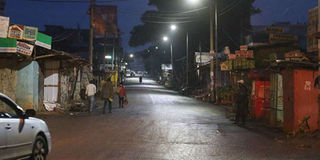Lockdown unwise now, but if people start dying like flies...

A deserted street in Nyeri on March 27, 2020, as nationwide curfew over coronavirus begins. PHOTO | JOSEPH KANYI | NATION MEDIA GROUP
What you need to know:
- While it is true that coronavirus deaths are rare in Kenya at the moment, it is also true that the rate of infection is growing exponentially.
- If people follow the advisories from the government, perhaps the Grim Reaper will be discouraged.
We are in the midst of a plague of biblical proportions, and the government is hardly in a position to mitigate most of its ill effects.
To make matters worse, we as individuals are cooperating more with the virus than with official advisories on this matter.
While it is true that coronavirus deaths are rare in Kenya at the moment, it is also true that the rate of infection is growing exponentially.
We can only hope that the floodgates will not open, sweeping us all into unprecedented misery.
The government must have by now learnt a few useful lessons on how to protect its people from those countries that have gone to hell and are on their way back to the living.
China easily comes to mind. The virus, which is said to have originated there, ravaged the city of Wuhan before the authorities locked it down.
Today, although China is not free from the coronavirus, the pandemic is in retreat. The Chinese could tell us how they went about it.
LOCKDOWN
The example that we cannot dare follow is Italy, the country that currently has the highest number of deaths.
When the history of the Covid-19 pandemic is written, this country will feature prominently, first because its government failed to protect its ageing population, and then because it dilly-dallied, leading to 7,000 deaths since mid-February.
Right now, Italy is in complete shutdown, quarantining 60 million people, but the infection rates have not subsided and many more could die before the virus is contained.
However, even this drastic move pales in comparison with what has just happened in India – all of its 1.3 billion souls have been put under quarantine.
In ordinary circumstances this would sound like an overreaction, because after all, only 10 deaths have been reported out of 519 confirmed cases, but these are not ordinary times.
This lockdown means confining people at home, closing down “all shops, commercial establishments, factories, workshops, offices, markets, and places of worship”, and stalling public transport.
CLOSED BORDERS
From all this, one could conclude that Kenya, which has reported 31 infections so far, need not enforce such strict orders, but the fact that for too long the country kept its ports of entry open until two weeks after the first case was identified, may mean that the worst is still ahead.
It is true that the raft of coercive measures already announced – closure of places of worship, bars and entertainment joints, and a ban on congregating in public – may work, but only if wilful ignorance and irresponsibility are curbed.
For example, it is disheartening to learn that although the Presbyterian Church of East Africa (PCEA) was among the first to ban church worship, some pastors are advising their parishioners to hold Sunday services in private homes.
What these pastors don’t seem to realise is that the virus does not lurk in church buildings; it is spread by people through close association even when the symptoms are not obvious, hence the sensible orders not to congregate anywhere.
POVERTY
Indeed, a spike in the infection rate may be inevitable and the government forced to impose even more draconian measures, a complete lockdown being the most extreme.
Right now, there is a robust debate between proponents of a countrywide lockdown who contend that it is the only way to halt the grim toll of infections, and the realists who consider any move to lock people inside their compounds to be naïve and counterproductive.
What will happen, they ask, to the millions of people who live in shanties and low-rent estates?
Will the government provide them with food and water for the duration of the lockdown?
And since most depend on daily wages to fend for their families, should they expect the government to provide these things?
The answer is no; it does not have the capacity to cushion the effects of a lockdown on already desperate denizens, neither can it watch helplessly as the pandemic decimates the population.
ADVISORIES
Even those critics whose knee-jerk reaction is to oppose everything the government tries to do offer no solution to this conundrum; should it close its eyes and let the pathogen run its course killing thousands, or risk insurrection from people who believe it is better to die on the streets than cooped up in a hovel watching their children starve.
Unlike those social media pundits who know everything, I don’t pretend to have an answer to this vexing problem.
All that can be said is that if people follow the advisories from the government – to stay home as much as possible, keep a healthy distance from acquaintances, wash hands frequently and avoid crowds – perhaps the Grim Reaper will be discouraged.
Right now, the country cannot afford a lockdown on the Indian scale, but if Kenyans start dying like flies, it would be highly welcome regardless of the repercussions.
Mr Ngwiri is a consultant editor. [email protected]





